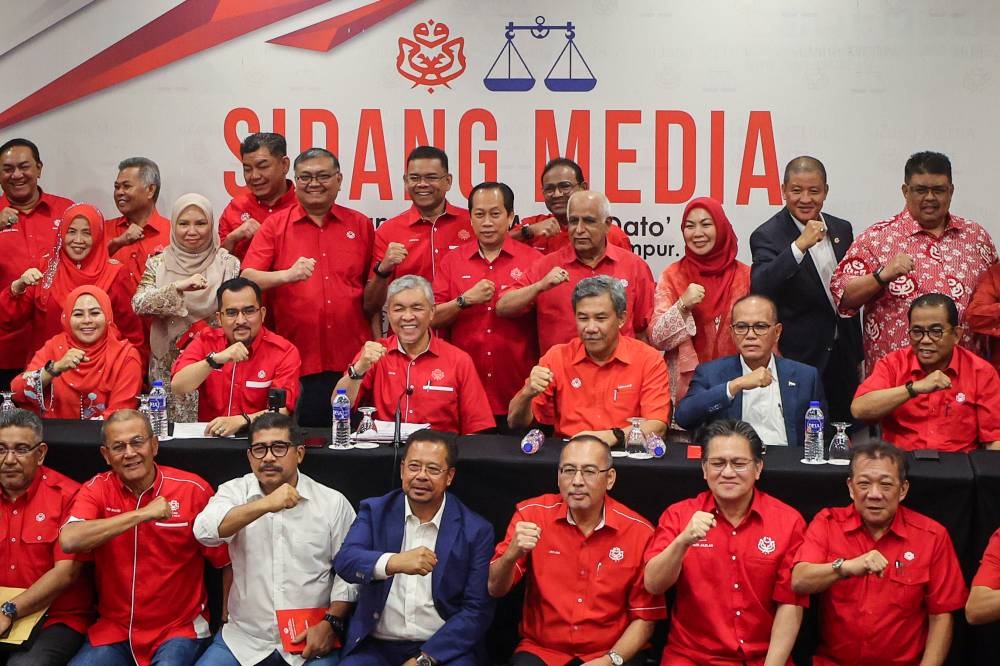Post-Umno Polls: The right choice is to stay in the centre
SYAZA SHUKRI
After two postponements and a significant change to the rules, Umno finally held its internal polls within the stipulated period of six months after GE15. The most watched competitions were of course for vice presidents and supreme council members. This is due to the party’s decision to exclude the presidency and deputy presidency from being contested in the name of stability for both the party and the unity government.
Many analyses have already been done on the decision to allow Datuk Seri Ahmad Zahid Hamidi and Datuk Seri Mohamad Hasan to win the top posts uncontested. Surely, many more written and verbal analyses will come in the next few weeks to unpack the meaning behind those who win the party polls. Not least would be discussion on where the women within Umno’s top leadership are.
However, what is most obvious to observers so soon after the results were announced is that Zahid's grip on the party appears to be strong for the foreseeable future.
It doesn’t mean that he is invisible from challenges and criticism.
The new addition of Datuk Seri Johari Abdul Ghani as vice president for example is evidence that it won’t be all rosy for the president. He is part of the “cluster” that wanted GE15 to be conducted early in hopes of getting into government with their relatively clean record in comparison to the so-called “court cluster”.
Nevertheless, even with this more balanced addition, we can see that Umno continues its traditional trajectory and path that is based on political patronage.
With Zahid in the fold of the unity government, benefits would most likely reach those who support him, and the support came out in force. Despite some interesting wins such as the new Umno Youth chief and the defending Umno Wanita chief who defeated Tan Sri Shahrizat Abdul Jalil, we largely see a continuation within Umno.
This is partly explained by the expulsion and suspension of vocal critics of the Zahid-led leadership of Umno.
The sacking of certain leaders was read as the president’s reluctance for change when his position is at stake after leading the party towards its worst performance. It is also unfortunate that the Home Affairs Minisry chose to interfere with the Registrar of Societies’ position on the matter of election for the party’s president—or lack thereof.
How will the status quo then affect the longest serving Malay party in Malaysia?
At the moment, the choice to remain steadfast with Zahid might be the best strategy for the party in terms of rallying members behind the leadership. However well this may be for short-term benefit, on the longer run, the party may continue to lose its relevance to those who wish to see Umno evolve with time.
In other words, democracy was sacrificed at the altar for stability, and this may be uncompromising to some.
But the question remains if Umno were to change, what would it turn into? A more progressive Umno would be a better bedfellow of Pakatan Harapan. But would such Umno be able to withstand the onslaught of racial and religious attacks?
I would argue that Umno would in fact benefit most by staying on the centre right of the political spectrum. Of course, some may say that Umno has actually veered more to the right in recent memories.
But we have to remember that the political spectrum is relative to others. In comparison to other contemporary right-wing parties in Malaysia, Umno appears to be in the centre. In doing so, they will effectively win support from moderate Malays who seek a party representing the community without jeopardizing relations with others.
Strategically, this is good for Umno because it helps voters and the general public to differentiate Umno from other Malay-based parties. There might be a push within Umno to bring it closer to the right, but doing so would blur the line between Umno and other parties, further making it irrelevant.
In other words, what is unique about Umno right now is the choice to stay in the centre. Umno would benefit from those who are wary of racialised politics but unwilling to consider themselves progressives or liberal.
Though risky, the election for the president and deputy president should have gone ahead. Regardless of who would have won those posts, it would have been strategically unwise for them to bring the party into Perikatan Nasional to form the so-called largest Malay bloc.
This is of course rendered academic now that Zahid would continue to lead Umno side-by-side with Datuk Seri Anwar Ibrahim to bring Malaysia to her glory with the participation of people from all backgrounds and all walks of life.
Syaza Shukri, PhD is an assistant professor of political science at International Islamic University Malaysia.
The views expressed in this article are the author's own and do not necessarily reflect those of Sinar Daily.









